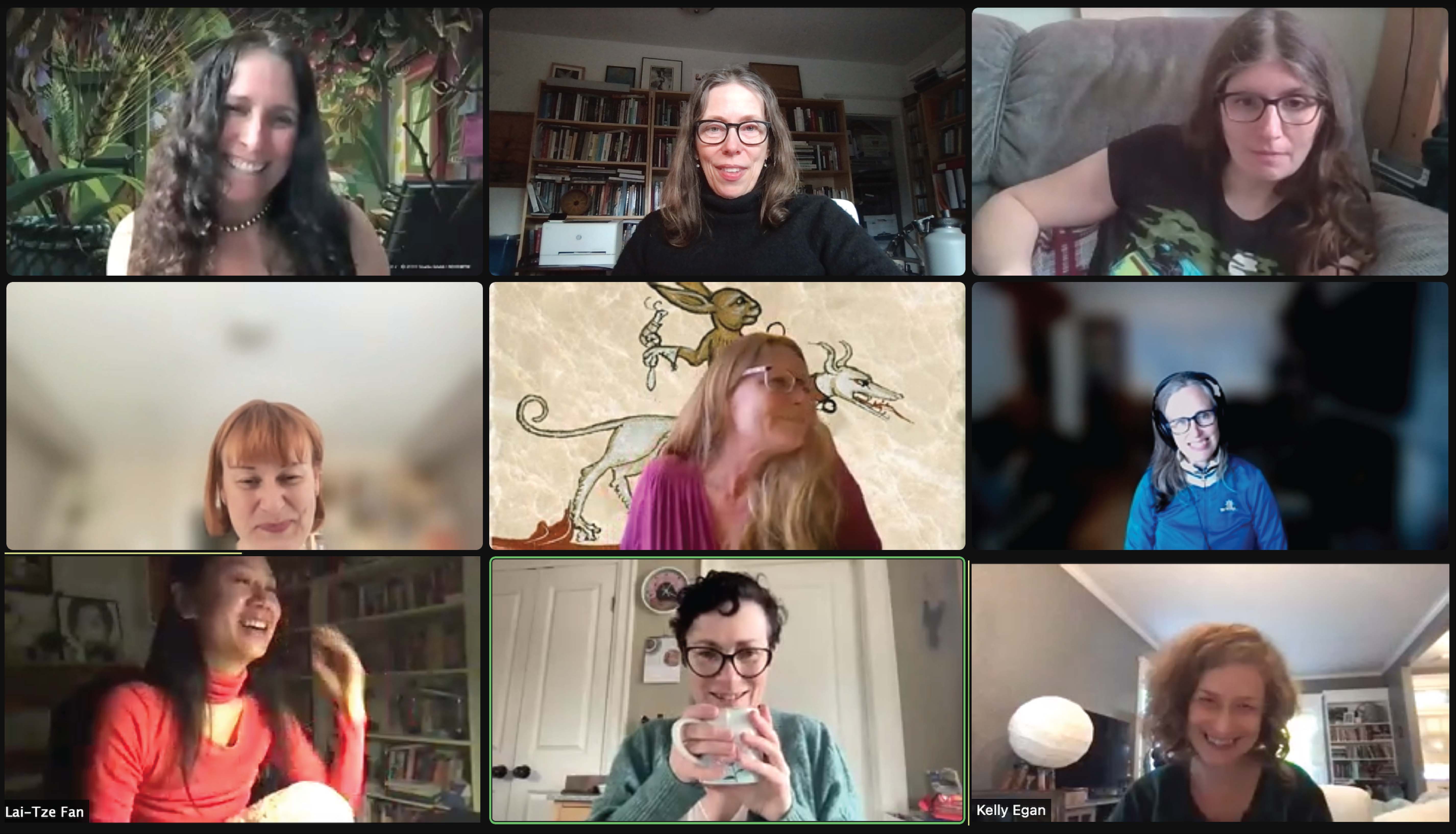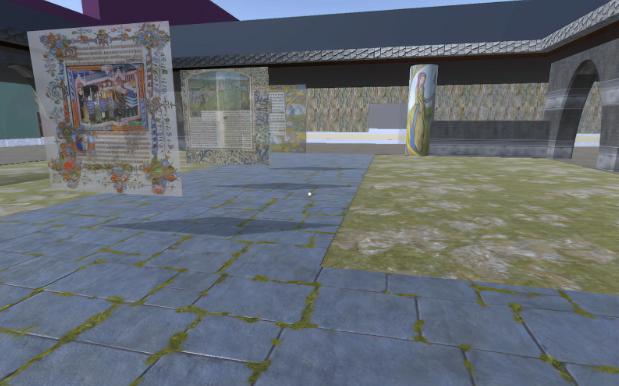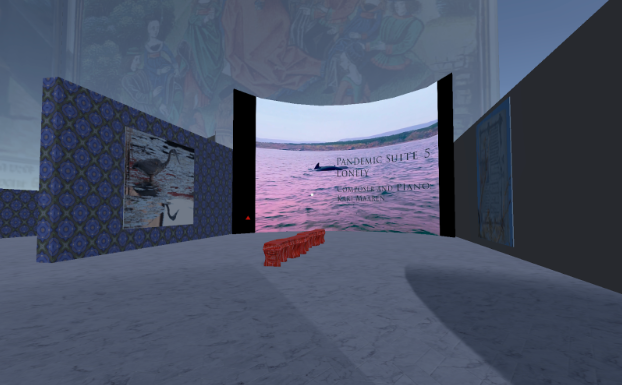English Department and The Decameron Collective receive 2023 Robert Coover Award Honourable Mention
English Department members Dr. Kari Maaren, Dr. Monique Tschofen and Dr. Izabella Pruska-Oldenhof from the School of Image Arts, along with The Decameron Collective, (external link) win Honorable Mention for the 2023 Robert Coover Award for a Work of Electronic Literature, an international award given for the best work of electronic literature of any length or genre.
.jpg)
English Lecturer, Dr. Kari Maaren; English Associate Professor, Dr. Monique Tschofen and School of Image Arts Associate Professor, Dr. Izabella Pruska-Oldenhof
The Decameron Collective comprises nine scholar-creators spanning Canada's academic landscape, including Dr. Jolene Armstrong from Athabasca University, Dr. Kelly Egan from Trent University, Dr. Lai-Tze Fan from the University of Waterloo, Dr. Caitlin Fisher from York University, Dr. Angela Joosse from the Canadian Research Knowledge Network and Dr. Siobhan O’Flynn from the University of Toronto.

Top row: Dr. Caitlin Fisher, Dr. Monique Tschofen, Dr. Kari Maaren
Middle row: Dr. Izabella Prussia-Oldenhof, Dr. Jolene Armstrong, Dr. Angela Joosse
Bottom row: Dr. Lai-Tze Fan, Dr. Siobhan O’Flynn, Dr. Kelly Egan.
“This Honorable Mention is a real honour. The namesake of this award, Robert Coover, was a pioneer postmodernist short story novelist and short story writer whose works have been adapted into film and who has collaborated with luminaries like Art Spiegelman. His public essays on literary hypertext are seminal in the field, and he supervised the most important electronic writers of this generation,” Dr. Tschofen notes. Additionally, Dr. Maaren emphasizes, “It puts us in the company of luminaries in Electronic Literature who showed the world how digital environments could challenge and expand literary print cultures.”
The Decameron 2.0 is an interactive digital storytelling world created in WebGL, designed in dialogue with Giovanni Boccaccio’s medieval frame narrative set in Florence during the Great Plague (1353). Boccaccio’s The Decameron offered literature a model for uniting heterogeneous stories inside one frame narrative. This work of literature stood apart from literary works before and after because of its representations of strong, complex women storytellers. “It seemed logical, as the world was shutting down in March of 2020 and these nine women started to meet over Zoom to tell stories to each other for us to return to and really think about this source text,” says Dr. Tschofen.

Credits: The Decameron 2.0 by the Decameron Collective
The Decameron 2.0’s explorable online gallery spaces feature one-hundred short, poetic co-created sound, text, still image and film works that together offer a living archive of women’s lives in times of catastrophe. Motherhood, sisterhood and friendship are persistent themes. Many of the works in the Decameron 2.0 work like palimpsests, layering archival assets from the ancient and medieval manuscript tradition with contemporary photography and film to underline the continuities between that time and ours.
The Decameron Collective understands the work as Research Creation, a research method that has been a category acknowledged by SSHRC for well over a decade and is at the core of one of the three specializations of Toronto Metropolitan University (TMU) and York University’s Joint Graduate Programme in Communications and Culture program. Research creation methods experiment with new ways of posing and answering critical research questions.
Dr. Tschofen said, “Working with a group of immensely talented storytellers to create first, and then theorize what we made through our respective disciplinary approaches, has been tremendously generative. We have exhibited this work internationally four times, including in Portugal, Japan, Toronto, and Calgary. The work has led to the development of workshop methods that we successfully brought to international audiences of feminist philosophers, electronic literature scholars, and digital humanities scholars. We have multiple published and soon-to-be published academic articles about the work that underline its multimodal intertextuality, situating it, for example, in relation to the medieval manuscript tradition of marginalia and palimpsests, and we have contextualized the work in relation to contemporary practices of autoethnography as well as feminist care ethics.”

Two films set Boccaccio’s medieval tale in a garden landscape. Credits: Dr. Monique Tschofen and Dr. Hendrick de Haan (2023).
At its core, the work is collaborative and co-creative. For example, Dr. Maaren fused her storytelling and musical passions through digital collaboration. She composed pandemic lockdown-inspired musical improvisations, enhanced by visual and cinematic treatments from her Collective partners. These pieces unified the galleries within Decameron 2.0. Dr. Maaren values the diverse perspectives her collaborators bring, enriching the narratives in unexpected ways.

Credits: Dr. Kari Maaren’s work installed in The Decameron 2.0 (2023), film by Dr. Monique Tschofen.
A challenge Dr. Tschofen notes is that despite SSHRC’s support for research creation, getting humanities scholars who have grown used to considering the academic book and the academic journal article as the only measures of meritorious work to understand and appreciate the significance of critical possibilities engaged through research creation is not easy. “This kind of work of thinking-made-material is holistic in ways that traditional scholarly writing is not,” Dr. Tschofen notes. “The Decameron 2.0 is creative electronic storytelling and it is also much more than that. The work rigorously engages with bodies of knowledge ranging from literary and book history to the history of art and the history of philosophy; its design critically models modes of open-ended and interactive inquiry that platform and game studies, interactive documentary, as well as museum studies have long been advocating; and conceptually, it’s deeply informed by ancient and medieval philosophy as well as post-humanism and speculative feminisms. How it was made, how it was designed, and how it is exhibited, and what it says are all part of the takeaways for other scholars.”
Funding for Decameron 2.0 was provided by a TMU Faculty of Arts Research Grant, grants from Athabasca University, Dr. Tschofen’s and Dr. Jolene Armstrong’s (Athabasca University) SSHRC IDG grants for Digital Imaginations grants and the Decameron Storyworld.